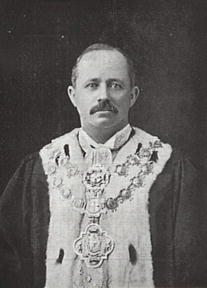
Nunhead is a suburb in the London Borough of Southwark in London, England. It is an inner-city suburb located 4 miles (6.4 km) southeast of Charing Cross. It is the location of the 52-acre (0.21 km2) Nunhead Cemetery. Nunhead has traditionally been a working-class area and, with the adjacent neighbourhoods, is currently going through a lengthy process of gentrification. Nunhead is the location of several underground reservoirs, built by the Southwark and Vauxhall Waterworks Company.

Freda Corbet was a British Labour Party politician. Born in London, Corbet spent some time as a teacher in Cornwall before moving back to London to work with her husband in his shop. The couple were both members of the Independent Labour Party and were elected as councillors on London County Council in 1934. There she served on the education committee, helping to introduce comprehensive schools to the city.

Charles George Ammon, 1st Baron Ammon, PC, DL, JP was a British Labour Party politician.
Thomas Edward Williams, 1st Baron Williams, was a peer of the United Kingdom.

The Bakerloo line extension is a proposed extension of the London Underground Bakerloo line in South London from its current terminus at Elephant & Castle to Lewisham station.
Sir Richard James Meller was a British barrister and Conservative politician.

Richard Strong was an English Liberal politician.

An election to the County Council of London took place on 2 March 1922. It was the eleventh triennial election of the whole council. There were sixty dual member constituencies and one four member constituency, making a total of 124 seats. The council was elected by First Past the Post with each elector having two votes in the dual member seats.

Cecil Aubrey Gwynne Manning was a British Labour Party politician.

George Alexander Hardy was an English businessman and Liberal Party politician who served for many years as a councillor in South London, and briefly as a Member of Parliament (MP) for the Stowmarket division of Suffolk.

Charles Goddard Clarke was a British businessman and Liberal politician.
Arthur Leonard Bateman was a British businessman and Conservative Party politician.

John Edward Sears was a British architect and politician.

The London Trades Council was an early labour organisation, uniting London's trade unionists. Its modern successor organisation is the Greater London Association of Trades (Union) Councils

Sir Allen Arthur Taylor was an Australian businessman and New South Wales state politician who was Lord Mayor of Sydney, Mayor of Annandale and a member of the New South Wales Legislative Council.
Sir Richard Coppock was a British trade unionist and politician.
Frederick George Burgess was a British politician and trade unionist.
James Joseph Nejdl was a politician from the U.S. state of Indiana. In 1924 and 1925 he served as acting Lieutenant Governor of Indiana.
W. Richard Davies was a Welsh trade unionist and political activist. The president of one union, and general secretary of another, he also served as a city councillor and contested numerous Parliamentary elections.
Leslie Charles Merrion was a British trade unionist, broadcaster and politician.












